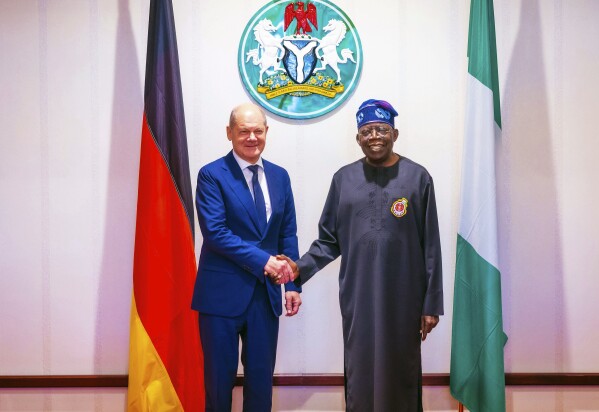Germany Eyes Nigerian Natural Gas
German Chancellor, Olaf Schulz, visited Abuja on Sunday, 29 October 2023 on an official visit aimed at boosting trade with Nigeria. With the trade between the two countries worth an estimated 3 billion Euros, and as Germany’s second largest trading partner in sub-Saharan Africa, Nigeria’s oil and gas sector is an attractive target for Germany as it tries to move further away from its previously entrenched position with Vladimir Putin’s Russia.
Sanctions and punitive tariff measures resulting from the Ukraine war have significantly dislocated energy supplies to Europe in general and Germany in particular. The destruction of the sub-sea gas lines through the Baltic further limited Germany’s ability to meet its energy needs from previously cheap Russian gas. Adding to the strategic pressure on European fuel markets, the destabilisation of the Sahel by military coups in 4 countries across the region has set plans for a trans Saharan gas pipeline running from Nigeria to Algeria back by years.
As Europe’s largest economy and largest manufacturing base in the EU seeks alternative supplies, Scholz almost certainly has his eyes on the very light, sweet Nigerian crude and the high volumes of LNG that the country has the potential to produce from its estimated 202 trillion cubic feet of natural gas reserves. Also discussed were the potential for development of a future hydrogen production and export sector in Nigeria. The latter is seen as an area that Germany could assist with and invest in.
Apart from economic partnership, major pillars of the two countries’ future cooperation will likely include addressing regional and global issues such as migration, security and the recent spate of coups in West and Central Africa. Scholz raised the issue of migration across from sub-Saharan countries to Europe via the trafficking and illegal migration routes across the Sahel and Sahara to the north African coast. Facing major pressures at home to curb the problem of migration, Scholz spoke of the need to manage the problem through implementation of “co-management which is benefiting the two countries the best”.

Following his visit to Abuja, the German leader opened a German-Nigerian business forum in Lagos on Monday, 30 October before flying to Ghana on his final stop on this tour.
Comment:
The development of an oil and gas trade deal with Nigeria is an obvious evolution in the development of Germany’s energy strategy. Arete addressed the challenge of filling the gap in supplies of natural gas in our Deep Dive in Feb 2022 (you can read it here). Since then, the situation has increased in complexity. With significant uncertainty in the Middle East resulting from the ongoing war in Israel and its neighbouring territories, supplies from Qatar and other regional suppliers face a spike in prices and potentially disruption in supply chains. The move by Germany is timely and focussed. Nigeria has suffered badly with loss of market share in the last 2 years and will certainly benefit from an export deal. We may well see the country ramping up its exports via Bonny and other LNG terminals in coming weeks.
Increased production will have a knock-on effect of increased tanker traffic in Nigerian territorial waters and its Exclusive Economic Zone. It will also generate greater activity onshore and in the swamps as demand for raw gas supplies increases. This might accelerate President Tinubu’s pre-election declaration of his determination to secure the country’s oil and gas sector.

